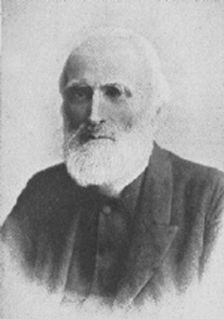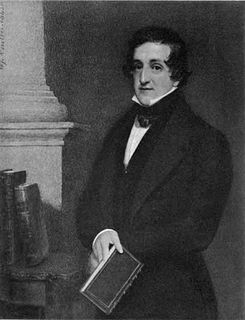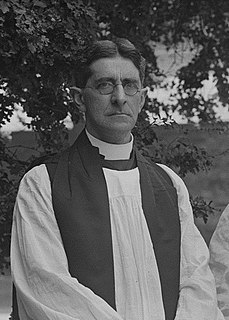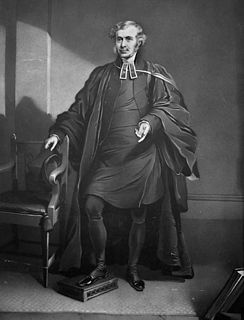Related Research Articles

Fenton John Anthony Hort (1828–1892), known as F. J. A. Hort, was an Irish-born theologian and editor, with Brooke Foss Westcott of a critical edition of The New Testament in the Original Greek.
The Norris–Hulse Professorship of Divinity is one of the senior professorships in divinity at the University of Cambridge.

John Cam Hobhouse, 1st Baron Broughton,, known as Sir John Hobhouse, Bt, from 1831 to 1851, was an English politician and diarist.
John Hulse was an English clergyman. He is now known mainly as the founder of the series of Hulsean Lectures at the University of Cambridge.
John James Blunt was an English Anglican priest. His writings included studies of the early Church.
John Howard Marsden was an English cleric and academic. He was an antiquarian and became in 1851 the first Disney Professor of Archaeology at the University of Cambridge.

The Hulsean Lectures were established from an endowment made by John Hulse to the University of Cambridge in 1790. At present, they consist of a series of four to eight lectures given by a university graduate on some branch of Christian theology.

Frederic Henry Chase was a British academic and Bishop of Ely.
Ernest Arthur Edghill, B.D., was an Anglican priest and theological writer. He was the Hulsean Lecturer at Cambridge 1910-11, and Lecturer in Ecclesiastical History at King's College London.

Charles John Ellicott (1819–1905) was a distinguished English Christian theologian, academic and churchman. He briefly served as Dean of Exeter, then Bishop of the united see of Gloucester and Bristol.

John Allen Fitzgerald Gregg CH (1873–1961) was a Church of Ireland clergyman, from 1915 Bishop of Ossory, Ferns and Leighlin, in 1920 translated to become Archbishop of Dublin, and finally from 1939 until 1959 Archbishop of Armagh. He was also a theologian and historian.

The CambridgeFaculty of Divinity is the divinity school of the University of Cambridge. It houses the Faculty Library.
Henry Crewe Boutflower, was a Hulsean essayist and minister. Boutflower was the son of John Boutflower, surgeon, of Salford. He was educated at the Manchester Grammar School, and in 1815 entered St. John's College, Cambridge. In 1816 he gained the Hulsean theological prize. His Hulsean prize essay, which was published in 1817 at Cambridge, was entitled 'The Doctrine of the Atonement agreeable to Reason.' The degrees of B. A. and M. A. were conferred on him in 1819 and 1822, and he was ordained in 1821, when he became curate at Elmdon near Birmingham, having previously acted as assistant-master at the Manchester Grammar School.
Henry John Rose (1800–1873) was an English churchman, theologian of High Church views, and scholar, who became archdeacon of Bedford.
James Fawcett (1752–1831) was an English clergyman. He was Hulsean Professor of Divinity at the University of Cambridge from 1795 to 1815.

Richard Parkinson D.D. (1797–1858) was an English clergyman, known as a canon of Manchester Cathedral, college principal, theologian and antiquarian.
Frederick Robert Tennant, best known as F. R. Tennant was a British theologian, philosopher of religion and writer.
Christopher Benson was a Cambridge educated theologian who achieved prominence on account of his abilities as a preacher and lecturer. In 1820 he was chosen as the first Hulsean Lecturer. Later he was one of the first to apply the term "Tractarians" to John Keble, Edward Pusey and other pioneers of what came to be known as the Oxford Movement within the Church of England. Christopher Benson was not a supporter, and engaged in high-profile theological controversies on matters such as the "apostolical authority of the Fathers".

Edward Pearson (1756–1811) was an English academic and theologian, Master of Sidney Sussex College, Cambridge from 1808.
Arthur Malortie Hoare was an English first-class cricketer active 1844–49 who played for Surrey and Cambridge Town Club. He played in 21 first-class matches. He subsequently became an Anglican priest.
References
- ↑ Lewis, S. (ed.) (1848). A Topographical Dictionary of England. pp. 479–97, Cambridge–Cambridgeshire. Retrieved 2007-08-21.CS1 maint: extra text: authors list (link)
- ↑ The Times , 10 April 1841, p.6 col.b, reprinted from the Cambridge Advertiser .
| This article relating to the University of Cambridge is a stub. You can help Wikipedia by expanding it. |